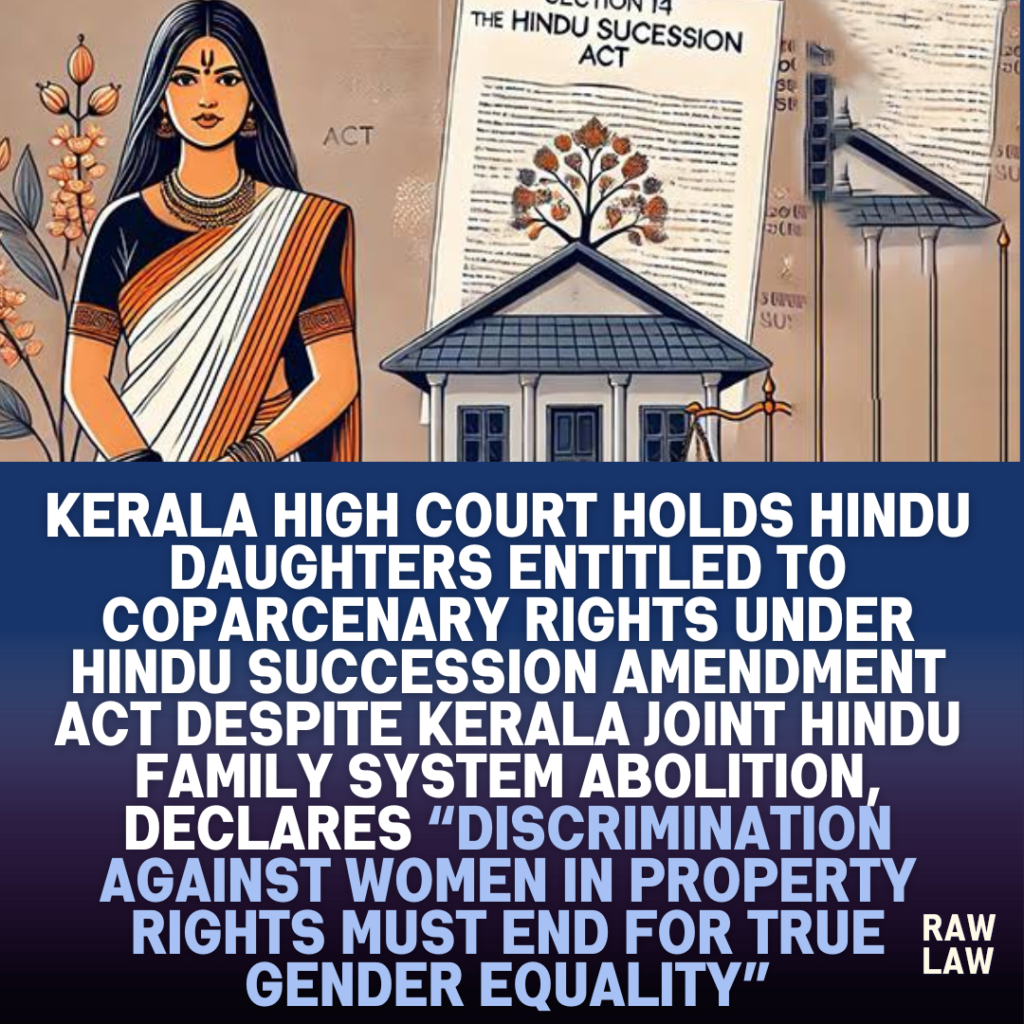Court’s Decision
The Kerala High Court allowed the second appeal, holding that daughters are entitled to coparcenary rights by birth under the Hindu Succession (Amendment) Act, 2005, despite the Kerala Joint Hindu Family System (Abolition) Act, 1975, and directed partition of the plaint schedule properties, granting the daughters their lawful shares. The Court held that the State Act does not override the 2005 Amendment, and Article 254(2) of the Constitution mandates that the central enactment prevails.
Facts
The appellants, daughters of the deceased, filed a suit for partition of ancestral properties, asserting their coparcenary rights under the Hindu Succession (Amendment) Act, 2005, which was dismissed by the trial court, stating the Kerala Joint Hindu Family System (Abolition) Act, 1975 precluded such claims. The first appellate court partially allowed partition but limited shares based on the interpretation of the State Act. The appellants approached the High Court, challenging the lower courts’ restrictive interpretation, seeking recognition of their coparcenary rights by birth post-2005 amendment.
Issues
Whether daughters are entitled to coparcenary rights by birth under the 2005 Amendment in Kerala, despite the 1975 State Act.
Whether the Kerala Joint Hindu Family System (Abolition) Act overrides the Hindu Succession (Amendment) Act, 2005, in light of Article 254(2) of the Constitution.
Whether daughters can seek partition of ancestral property in Kerala after the 2005 amendment.
Petitioner’s Arguments
The petitioners argued:
- The 2005 Amendment grants daughters equal coparcenary rights by birth, applicable nationwide, including Kerala.
- The 1975 State Act does not abolish the joint family system explicitly; it only converts joint tenancy into tenancy-in-common, not denying coparcenary status.
- Article 254(2) mandates that central legislation (Hindu Succession Amendment) overrides conflicting state legislation.
- Supreme Court in Vineeta Sharma v. Rakesh Sharma reaffirmed daughters’ rights by birth under the 2005 Amendment, reinforcing gender equality.
Respondent’s Arguments
The respondents argued:
- The Kerala Act, post-1975, abolished the joint family system, preventing daughters from claiming coparcenary rights.
- Multiple Kerala High Court judgments held that the 2005 Amendment does not apply in Kerala due to the State Act’s prior field occupation.
- The State Act received Presidential assent, making it immune from central legislative override.
- The Will executed by the deceased father validly bequeathed property to the son, limiting daughters’ claims.
Analysis of the Law
The Court analysed:
- Sections 6 of the Hindu Succession Act as amended in 2005, granting daughters coparcenary rights by birth.
- Sections 3 and 4 of the Kerala Act, noting they only effect deemed partition and abolish right by birth but do not expressly abolish the joint family system.
- Article 254(2) of the Constitution, which ensures central law prevails over inconsistent state law.
- The doctrine that Parliament’s intent to eliminate gender discrimination in property rights must be honoured.
Precedent Analysis
Relied upon:
- Vineeta Sharma v. Rakesh Sharma (2020): Daughters have equal coparcenary rights by birth, irrespective of their father’s status at the time of the 2005 Amendment.
- Gurupad Khandappa Magdum v. Hirabai (1978): Notional partition does not end coparcenary status.
- Raichurmatham Prabhakar v. Rawatmal Dugar (2004): Headings do not control clear statutory provisions.
- Dharani Sugars (2019) and Mandvi Cooperative Bank (2010): Parliamentary debates can clarify legislative intent.
- The Court distinguished Babu v. Ayillalath Arunapriya and Kali Ammal v. Valliyammal, clarifying they were rendered without considering binding precedents.
Court’s Reasoning
The Court held:
- The 1975 State Act does not expressly abolish the joint family system in Kerala.
- The 2005 Amendment confers rights by birth on daughters, applicable throughout India, including Kerala.
- Presidential assent to the State Act does not preclude the central amendment from prevailing under Article 254(2).
- The object of the 2005 Amendment is to remove gender discrimination, which must be implemented in spirit and practice.
- Daughters are entitled to their shares, and the lower courts erred in denying full relief.
The Court stated: “Gender discrimination in property rights is unconstitutional, and daughters must receive equal treatment as sons in coparcenary property.”
Conclusion
The High Court:
- Allowed the second appeal.
- Set aside the lower courts’ restrictive findings.
- Held that daughters are entitled to coparcenary rights by birth under the 2005 Amendment.
- Directed partition of the ancestral property, ensuring the appellants’ rightful shares.
Implications
This judgment:
- Establishes that the 2005 Amendment overrides the Kerala Act, ensuring daughters’ coparcenary rights by birth.
- Reinforces gender equality in property inheritance laws across India, including Kerala.
- Guides future litigation on the interpretation of the Hindu Succession Amendment vis-à-vis state laws, ensuring constitutional compliance.
Short Notes on Referred Cases
Vineeta Sharma (2020): Affirmed daughters’ coparcenary rights by birth, ensuring gender equality.
Gurupad Khandappa Magdum (1978): Notional partition does not dissolve the joint family system.
Raichurmatham Prabhakar (2004): Titles do not override statutory text.
Dharani Sugars (2019) & Mandvi Cooperative Bank (2010): Parliamentary debates may clarify legislative purpose.
FAQs
1. Do daughters in Kerala have coparcenary rights under the 2005 Amendment?
Yes, daughters have coparcenary rights by birth under the 2005 Amendment, despite the Kerala Act.
2. Does the Kerala Joint Hindu Family System (Abolition) Act override the 2005 Amendment?
No, the 2005 central amendment prevails under Article 254(2) of the Constitution.
3. What does this judgment mean for pending partition cases in Kerala?
It enables daughters to claim their rightful coparcenary shares in ancestral properties, ensuring gender-equal succession.
